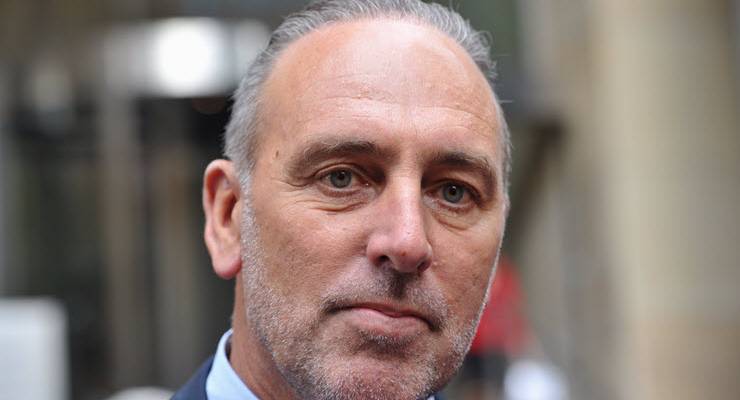
Last Friday evening at 6.20pm, I received an extraordinary email from the Department of Prime Minister and Cabinet (PM&C).
It was a long-overdue response to a freedom of information request I had submitted two months earlier, asking for correspondence about the possible attendance of Hillsong Church pastor Brian Houston at events during the prime minister’s recent US state visit.
Morrison did not even refute media reports that he had sought an invitation to the trip for his friend Houston, a wealthy religious guru who is currently under investigation by NSW Police for failing to report his father’s sexual abuse of children. Instead, the prime minister dismissed the matter as “gossip” when questioned about it by journalists, a non-denial so nakedly evasive it would cause Prince Andrew to break out in a sweat.
If Morrison’s aim was to kill the story, he failed. His equivocation made journalists even more suspicious about the supposed invite, and eight people — including me — subsequently submitted FOI requests for correspondence about Houston’s alleged invitation.
Even if full access to those documents was refused, PM&C would at least be forced to confirm the existence (or otherwise) of discussion about Houston’s invitation — or so I thought.
What I hadn’t factored in was the government’s alarming willingness to undermine its own FOI laws.
Citing a rarely used section of the FOI Act, PM&C’s response on Friday told me the department has decided “to neither confirm nor deny” the existence of documents relating to Houston, a convenient tactic to block all attempts to get to the truth.
Going further still, the department said that even if relevant documents did exist, PM&C would declare them exempt, arguing that releasing them “would, or could reasonably be expected to” damage Australia’s relationship with the United States. Without a hint of irony, an invitation that Scott Morrison had dismissed as gossip in September had, by November, morphed into a grave threat to international relations.
Having submitted around 50 various FOI requests over the past year, I am well used to the blocking and delaying tactics used by some departments. What worries me more is the recent shift I have witnessed in the way some government departments are treating requests for politically sensitive documents.
They no longer just refuse to hand over the information — now they simply refuse to abide by the government’s own FOI laws. They ignore mandatory deadlines, fail to abide by rulings from the Office of the Australian Information Commissioner (OAIC) and ghost requesters who dare to chase up overdue responses.
Ministers and officials know that in Australia’s toothless system there are no real consequences for departments that flout their own FOI laws. A complaint to the OAIC merely gives them more time to obfuscate, sucking the case into a bureaucratic vortex for weeks, months or even years. It is no wonder FOI refusals are at their highest level since records began.
Departmental officials are apparently “unfazed” about intentionally breaching FOI laws to play for time, according to emails obtained by Labor about the handling of one of its requests. Yet those officials are merely marching to the beat of their political superiors. Empowered by Trumpist populism, Morrison’s government is giving them the green light to break the law — and stuff the consequences.
As Australia’s democratically chosen leader, Scott Morrison is entitled to invite whoever he wants on a taxpayer-funded jaunt to the White House. But the flip side of the deal is he must be accountable for that decision and prepared to justify it to Australian voters. If he is not comfortable with his actions, that is more reason why we should know about it.
And what now for my FOI request about Houston’s invitation? I will soon be asking the OAIC to overturn PM&C’s decision and order the release of the documents. However, due to funding cuts and a huge backlog of cases, the OAIC is unlikely to complete its review until at least the middle of next year, at which point the issue will be long gone from the news cycle. I can neither confirm nor deny the system stinks.
What do you make of Australia’s FOI system? Write to boss@crikey.com.au and let us know. Please include your full name if you wish to be considered for publication.








From Peter Timmins
William Summers and others who seek to hold government to account have an uphill battle when exercising the right to know what government knows unless there are good reasons why we shouldn’t. The law and the way it is implemented has seen Australia on a long slide from the heady days thirty years ago when we were a leader in this aspect of good governance. Calls for attention have gone unheeded and the government’s own promises have been shelved or ditched. A commitment in December 2016 to ensure the law, policies and practices are fit for the 21st century saw recommendations (never disclosed) go to Brandis in December 2017 and Porter in March 2018. They are still there…. or in the bin?
Just as Morrison could have denied his request for a dinner invitation for Houston but chose not to, the same applies to the request for FOI documents. The department could have denied the papers exist but didn’t.
If you’ve got nothing to hide you’ve got nothing to fear. This government appears to have guilt written all over it.
How to grow Government Whistleblowers – 101: First, make deliberate moves to shut down government transparency by messing with the Freedom of Information legislation. Don’t be timid, do your very best. Next, or in parallel, attack journalism by executing search warrants and laying charges- this should hopefully cower such creatures into lazy ‘press release regurgitation’. Third, apply censorship to matters that should be open to public debate (Immigration and water-based operations come to mind). Remember, all of these can be done in parallel or in mixed order. Finally, cast aside any notion of ethics, morals or ‘correct and proper procedure’ in your governing endeavours. By taking these steps you will ensure that some brave souls will be so frustrated with your approach that they will simply say ‘Enough!’ and take dramatic action that will result in your closest held secrets being exposed.
I hope it plays out as you have predicted Richard.
Read a recent comment in the NYT where a grandfather asked his grandson what he wanted to be when he grew up and he answered a ‘whistleblower’. I replied that I hoped he felt proud – as I certainly would if a one of my family members said the same.
Today’s edition of Crikey demonstrates that this corrupt, nasty and incompetent government will keep at least Crikey joins busy for the next couple of years charting the steeply declining honesty and integrity in government.
I guess this is the Westminster system for the 21St century. The government can ignore longstanding principles and do what it likes with absolute impunity……but what goes around, comes around.
This is why we need many more Assanges and Witness Ks to keep revealing this sly and shonky behaviour.